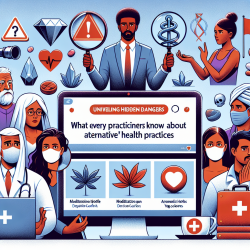The landscape of healthcare is continually evolving, and with it, the use of alternative health practices is becoming more prevalent. However, a recent study titled
A taxonomy of risk-associated alternative health practices: A Delphi study has shed light on the potential risks associated with these practices. For practitioners, understanding these risks is crucial in order to provide safe and effective care to clients, particularly in educational settings where young and vulnerable populations are involved.
Key Findings from the Study
The Delphi study conducted by Garrett et al. (2022) aimed to establish and classify risk-associated alternative health practices through the consensus of an interdisciplinary panel of 17 health experts. The study identified several categories of alternative health practices that pose significant risks:
- Practices conflicting with biomedical care: These include therapies that are largely untested or contradict established medical practices, potentially leading to adverse interactions or outcomes.
- Alternative belief systems: Practices rooted in non-scientific belief systems, which may delay or replace essential medical treatments.
- Physical manipulative therapies: Techniques such as chiropractic adjustments and acupuncture, which can cause physical injuries if not performed correctly.
- Herbal and nutritional supplements: The use of supplements that can interact negatively with prescribed medications or cause toxic effects.
Implications for Practitioners
As a practitioner providing online therapy services to schools, it is essential to be aware of these risks and take proactive steps to mitigate them. Here are some strategies to enhance your practice:
1. Stay Informed
Regularly update your knowledge on the latest research and guidelines regarding alternative health practices. This will help you provide evidence-based advice and make informed decisions about the therapies you recommend or allow within your practice.
2. Educate Clients and Families
Ensure that your clients and their families are aware of the potential risks associated with alternative health practices. Provide them with reliable information and resources to help them make informed choices about their health.
3. Foster Open Communication
Encourage clients to disclose any alternative therapies they are using or considering. This information is vital for assessing potential risks and interactions with conventional treatments.
4. Collaborate with Other Healthcare Providers
Work closely with other healthcare professionals, including doctors, nurses, and pharmacists, to ensure a comprehensive approach to client care. This collaboration can help identify and manage risks associated with alternative health practices.
5. Implement Risk Management Protocols
Develop and enforce protocols to monitor and manage the use of alternative health practices within your practice. This may include screening clients for high-risk practices, documenting adverse events, and providing appropriate referrals when necessary.
Encouraging Further Research
While the study by Garrett et al. (2022) provides a valuable framework for understanding the risks associated with alternative health practices, there is still much to learn. Practitioners are encouraged to engage in further research to explore these risks in more detail and develop strategies to mitigate them effectively.
1. Participate in Research Studies
Consider participating in or conducting research studies to contribute to the growing body of knowledge on alternative health practices. Your insights and experiences can help shape future guidelines and recommendations.
2. Share Your Findings
Share your research findings with the broader healthcare community through publications, presentations, and professional networks. This dissemination of knowledge is crucial for advancing the field and improving client care.
3. Advocate for Systematic Recording of Adverse Events
Support efforts to establish systematic methods for recording and analyzing adverse events related to alternative health practices. This data is essential for understanding the frequency and severity of risks and developing evidence-based safety protocols.
Conclusion
As alternative health practices continue to gain popularity, it is imperative for practitioners to stay informed and vigilant about the associated risks. By implementing the strategies outlined above and encouraging further research, you can enhance your practice and ensure the safety and well-being of your clients.To read the original research paper, please follow this link:
A taxonomy of risk-associated alternative health practices: A Delphi study.










